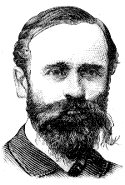-
|

|
Chapter 5: Late Nineteenth Century
and Realism
Washington
Cable
1844-1925
|
©
Paul P. Reuben
September 10, 2019
E-Mail
|
Page Links: |
Primary
Works |
Selected
Bibliography 1980-Present
| Study
Questions |
MLA Style
Citation of this Web Page
|

Source: American
Lit Chronology
In his early novels and
stories, George Washington Cable gave us perhaps our most memorable
view of the drama of multicultural Louisiana in the nineteenth
century, especially of New Orleans Creole life. Born in New Orleans
in 1844, Cable was of New England Puritan background on his mother's
side and of a Virginia slaveholding family of German descent on his
father's side. Upon the death of his father, Cable had to leave
school at age fourteen to take a job at the New Orleans customhouse.
At nineteen, during the Civil War, Cable enlisted in the Fourth
Mississippi Cavalry, little knowing that he was providing himself
with an experience that would form the basis of one of his most
popular novels. After the war Cable obtained a position as a surveyor
of the Atchafalaya River levees, contracted malaria, and was
incapacitated for two years. Taking advantage of the enforced
"leisure," he began writing and started to contribute a column to the
New Orleans Picayune. In 1869 Cable married Louise Bartlett, with
whom he was to have five children. As he established a home in New
Orleans, he worked as bookkeeper for a cotton firm after a brief
stint as a newspaper reporter. - James Robert Payne, Heath
Anthology Introduction
Primary
Works
Old Creole
Days, 1879; The Grandissimes, 1880, rev. 1883;
Madame Delphine, 1881; Dr. Sevier, 1884; John
March, Southerner, 1894; The Negro Question, ed. Arlin
Turner, 1955.
Achievement
" ... when it comes
down to moral honesty, limpid honesty, and utterly blameless
piety, the Apostles were mere policemen (compared) to Cable." -
Mark Twain
In his writings, George W.
Cable sketched life of his native Louisiana and New Orleans. In a
time of Howellsian "smiling aspects" as representative of American
society, Cable wrote of violence and death, of racial intermarriage,
and of contradictions and complexities. Recognized today as one the
South's most acute social critics, Cable attacked political
corruption and advocated civil rights for the Blacks. He wrote of a
vanishing Creole culture, of social classes, and of the baggage of
the past and its consequences on the present.
Selected
Bibliography 1980-Present
Alexander, Robert A. "The
Irreducible African: Challenges to Racial Stereotypes in George W.
Cable's The Grandissimes." in Disheroon-Green, S. and Lisa
Abney. eds. Songs of Reconstructing South: Building Literary
Louisiana, 1865-1945. Westport, CT: Greenwood, 2002.
Benfey, Christopher.
Degas in New Orleans: Encounters in the Creole World of Kate
Chopin and George Washington Cable. Berkeley: U of California P,
1997.
Cleman, John. George
Washington Cable revisited. NY: Twayne, 1996. PS1246 .C54
Elfenbein, Anna S. Women
on the Color Line: Evolving Stereotypes and the Writings of George
Washington Cable, Grace King, Kate Chopin. Charlottesville: UP of
Virginia, 1994.
Gillman, Susan. "The
Squatter, the Don, and the Grandissimes in Our America." in Kaup,
Monika and Rosenthal, Debra J. eds. Mixing Race, Mixing Culture:
Inter-American Literary Dialogues. Austin U of Texas P, 2002.
Hebert-Leiter, Maria.
Becoming Cajun, Becoming American: The Acadian in American
Literature from Longfellow to James Lee Burke. Baton Rouge:
Louisiana State UP, 2009.
Kilcup, Karen L. ed. Soft
Canons: American Women Writers and Masculine Tradition. Iowa
City: U of Iowa P, 1999.
Ladd, Barbara.
Nationalism and the Color Line in George W. Cable, Mark Twain, and
William Faulkner. Baton Rouge: Louisiana State UP, 1996.
Petry, Alice H. A Genius
in His Way: The Art of Cable's Old Creole Days. Rutherford:
Fairleigh Dickinson UP, 1988.
Roberson, William H.
George W. Cable: An Annotated Bibliography. 1982.
Schmidt, Peter. Sitting
in Darkness: New South Fiction, Education, and the Rise of Jim Crow
Colonialism, 1865-1920. Jackson: UP of Mississippi, 2008.
Turner, Arlin. George W.
Cable, a biography. Durham: Duke UP, 1956. PS1246 .T8
Turner, Arlin. ed.
Critical Essays on George W. Cable. Boston: Hall, 1980.
Study
Questions
1. (a) Consider and discuss
how mob violence as represented in the charivari scene in "Jean-ah
Poquelin" prefigures lynch mob and other violence in the South of
Cable's day and in later periods.
(b) Consider how the
critical realist Cable undercuts romantic myths of the "noble
aristocracy" of the "Old South."
2. (a) In an essay, discuss
the significance of Cable's method of representing American language
in relation to his themes. Hint: Remember that American language does
not always mean English. Consider his representation of communication
in French and, depending on which of Cable's works are being studied,
other languages.
(b) Consider residual
romantic tendencies in the fiction of the southern realist George
Washington Cable.
(c) In an essay, discuss and
demonstrate--with specific references to passages of Cable's
fiction--how Cable undercuts ethnic stereotyping in his work.
MLA Style
Citation of this Web Page
Reuben, Paul P.
"Chapter 5: George Washington Cable." PAL: Perspectives in
American Literature- A Research and Reference Guide.
URL: http://www.paulreuben.website/pal/chap5/cable.html
(provide page date or date of your login).
| Top
|

